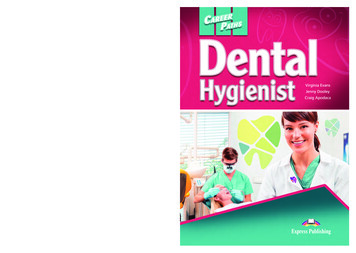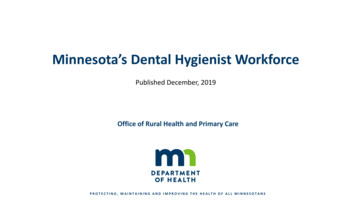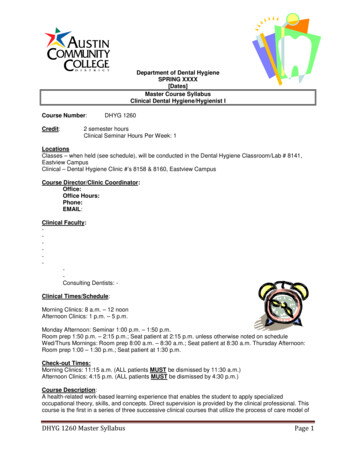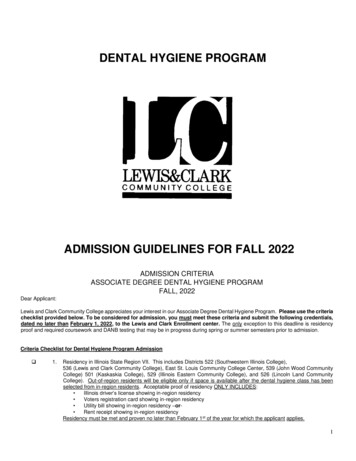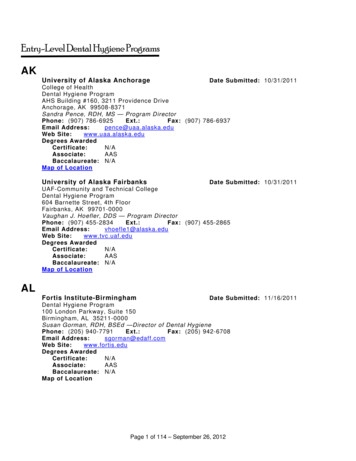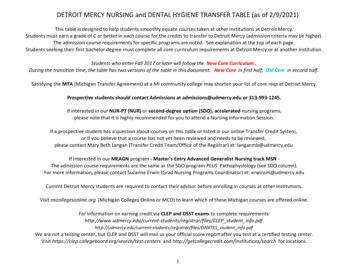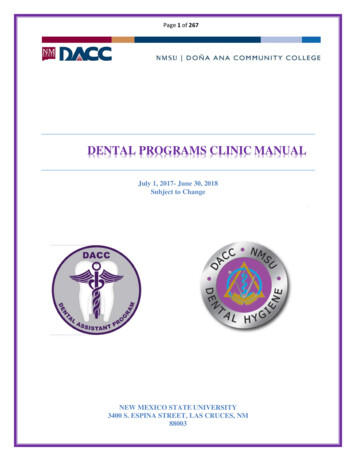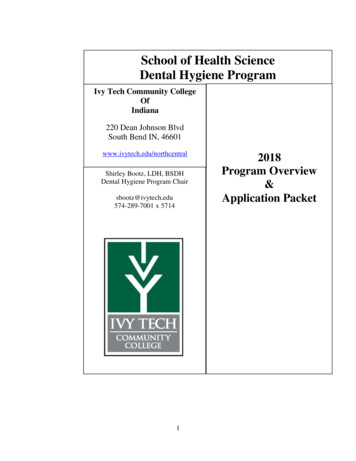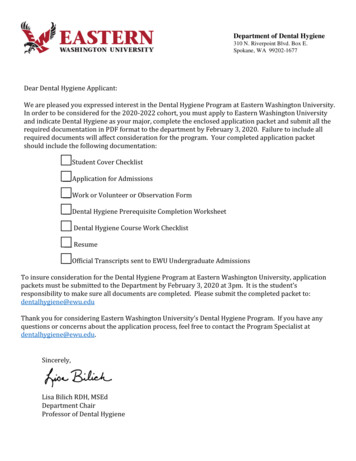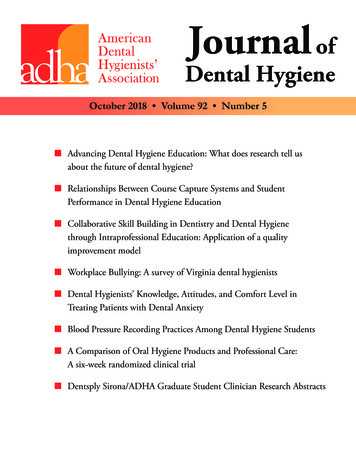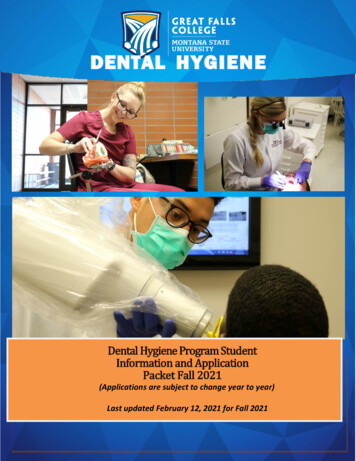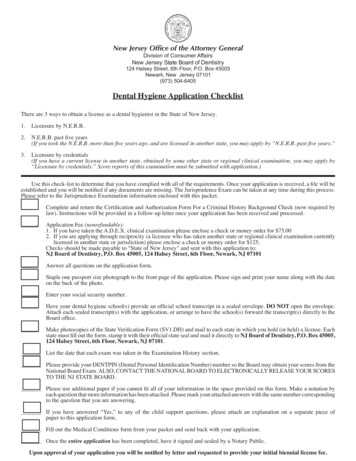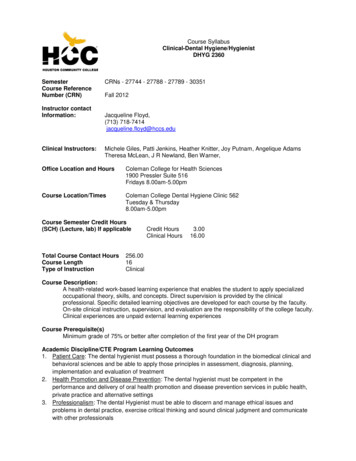
Transcription
Course SyllabusClinical-Dental Hygiene/HygienistDHYG 2360SemesterCourse ReferenceNumber (CRN)Instructor contactInformation:Clinical Instructors:CRNs - 27744 - 27788 - 27789 - 30351Fall 2012Jacqueline Floyd,(713) 718-7414jacqueline.floyd@hccs.eduMichele Giles, Patti Jenkins, Heather Knitter, Joy Putnam, Angelique AdamsTheresa McLean, J R Newland, Ben Warner,Office Location and HoursColeman College for Health Sciences1900 Pressler Suite 516Fridays 8.00am-5.00pmCourse Location/TimesColeman College Dental Hygiene Clinic 562Tuesday & Thursday8.00am-5.00pmCourse Semester Credit Hours(SCH) (Lecture, lab) If applicableTotal Course Contact HoursCourse LengthType of InstructionCredit HoursClinical Hours3.0016.00256.0016ClinicalCourse Description:A health-related work-based learning experience that enables the student to apply specializedoccupational theory, skills, and concepts. Direct supervision is provided by the clinicalprofessional. Specific detailed learning objectives are developed for each course by the faculty.On-site clinical instruction, supervision, and evaluation are the responsibility of the college faculty.Clinical experiences are unpaid external learning experiencesCourse Prerequisite(s)Minimum grade of 75% or better after completion of the first year of the DH programAcademic Discipline/CTE Program Learning Outcomes1. Patient Care: The dental hygienist must possess a thorough foundation in the biomedical clinical andbehavioral sciences and be able to apply those principles in assessment, diagnosis, planning,implementation and evaluation of treatment2. Health Promotion and Disease Prevention: The dental hygienist must be competent in theperformance and delivery of oral health promotion and disease prevention services in public health,private practice and alternative settings3. Professionalism: The dental Hygienist must be able to discern and manage ethical issues andproblems in dental practice, exercise critical thinking and sound clinical judgment and communicatewith other professionals
4. Community Involvement: Dental hygienists must appreciate their role as health professionals at thelocal, state, and national levels. The dental hygienist must assess, plan, and implement programs andactivities to benefit the general population. The dental hygienist must also be prepared to influenceothers to facilitate access to care and services.Course Student Learning Outcomes (SLO): 4 to 71. Assessment: The dental hygienist will be able to perform an examination that collects biological,psychological, and social information needed to evaluate the medical and oral conditions forpatients of all ages. This includes the ability to recognize and manage behavioral factors whichaffect oral health and to use that information to implement strategies that facilitate the provision oforal health care2. Diagnosis: The dental hygienist will be able to analyze and interpret data to formulate a dentalhygiene diagnosis related to and congruent with the diagnosis of the dentist and other healthprofessionals.3. Planning: The dental hygienist will be able to collaborate with the patient or other healthprofessionals, to formulate a comprehensive dental hygiene care plan that is patient centered andbased on current scientific evidence.Implementation: The dental Hygienist will be able to provide specialized treatment that includespreventive and therapeutic services designed to achieve and maintain oral health.4. Evaluation: The dental hygienist will be able to evaluate the effectiveness of the employed clinicaland educational services and modify as considered necessaryLearning Objectives (Numbering system should be linked to SLO - e.g., 1.1, 1.2, 1.3, etc.)Assessment: The dental hygienist will be able to perform an examination that collects biological,psychological, and social information needed to evaluate the medical and oral conditions forpatients of all ages. This includes the ability to recognize and manage behavioral factors whichaffect oral health and to use that information to implement strategies that facilitate the provisionof oral health careA. Perform a comprehensive examination using clinical, radiographic, periodontal, dental charting,and other data collection procedures to assess the patient’s needs.B. Recognize predisposing and etiologic risk factors that require intervention to prevent diseaseC. Obtain, review and update a complete medical and dental historyD. Recognize health conditions and medications that impact overall patient careE. Identify patients at risk for a medical emergency and manage the patient in a manner thatprevents an emergencyDiagnosis: The dental hygienist will be able to analyze and interpret data to formulate a dentalhygiene diagnosis related to and congruent with the diagnosis of the dentist and other healthprofessionals.A. Use assessment findings, etiologic factors and clinical data in determining a dental hygienediagnosisB. Identify patient needs and significant findings that impact the delivery of dental hygiene servicesC. Obtain the proper consultations as indicatedPlanning: The dental hygienist will be able to collaborate with the patient or other healthprofessionals, to formulate a comprehensive dental hygiene care plan that is patient centered andbased on current scientific evidence.A. Establish a collaborative relationship with the patient in the planned care to include the etiology,prognosis, and treatment alternativesB. Make referrals to other health care professionals.C. Obtain the patient’s informed consentD. Establish a planned sequence of care (educational, clinical and evaluation) based on the dentalhygiene diagnosis; identified oral conditions; potential problems; etiologic and risk factors; andavailable treatment modalities
E. Prioritize the care plan based on the health status and actual and potential problems of theindividual to facilitate optimal health.Implementation: The dental Hygienist will be able to provide specialized treatment that includespreventive and therapeutic services designed to achieve and maintain oral health.A. Utilize accepted infection control procedures.B. Obtain diagnostic quality radiographs.C. Select and administer appropriate chemotherapeutic agents and provide pre- and post-treatmentinstructions.D. Provide adjunct dental hygiene services that are legally permittedE. Provide oral health education to assist patients in assuming responsibility for their own oralhealth.F. Apply basic and advanced techniques of dental hygiene instrumentation to remove depositswithout trauma to hard and soft tissues.Evaluation: The dental hygienist will be able to evaluate the effectiveness of the employed clinicaland educational services and modify as considered necessaryA. Evaluate the effectiveness of the patient’s self-care and the dental hygiene treatment in attainingor maintaining oral healthB. Determine the clinical outcomes of dental hygiene interventionsC. Develop a maintenance program that meets the patient’s needsD. Provide referrals for subsequent treatment based on the evaluation findings.SCANS and/or Core Curriculum Competencies:SCANS Assessment: The dental hygienist will be able to perform an examination that collectsbiological, psychological, and social information needed to evaluate the medical and oralconditions for patients of all ages. This includes the ability to recognize and managebehavioral factors which affect oral health and to use that information to implementstrategies that facilitate the provision of oral health careo Workplace Competencies - Resources -Allocates Timeo Workplace Competencies - Resources -Allocates Material & Facility Resources Diagnosis: The dental hygienist will be able to analyze and interpret data to formulate adental hygiene diagnosis related to and congruent with the diagnosis of the dentist andother health professionals.o Workplace Competencies - Interpersonal -Teaches Otherso Workplace Competencies - Interpersonal -Serves Clients/Customerso Workplace Competencies - Interpersonal -Works with Cultural Diversity Planning: The dental hygienist will be able to collaborate with the patient or other healthprofessionals, to formulate a comprehensive dental hygiene care plan that is patientcentered and based on current scientific evidence.o Workplace Competencies - Information -Acquires & Evaluateso Workplace Competencies - Information -Organizes & Maintainso Workplace Competencies - Information -Interprets & Communicateso Workplace Competencies - Information -Uses Computers to Process Implementation: The dental Hygienist will be able to provide specialized treatment thatincludes preventive and therapeutic services designed to achieve and maintain oralhealth.o Workplace Competencies - Systems -Understands Systemso Workplace Competencies - Systems -Monitors & Corrects Performance Evaluation: The dental hygienist will be able to evaluate the effectiveness of the employedclinical and educational services and modify as considered necessaryo Workplace Competencies - Interpersonal -Negotiates to Arrive at a Decisiono Workplace Competencies - Technology -Maintains & Troubleshoots
Instructional Methods Web-enhanced (49% or less)Student Assignments Assessment: The dental hygienist will be able to perform an examination that collectsbiological, psychological, and social information needed to evaluate the medical and oralconditions for patients of all ages. This includes the ability to recognize and managebehavioral factors which affect oral health and to use that information to implementstrategies that facilitate the provision of oral health careo Various assigned readings from textbooks, peer-revo Projectso Portfolios Diagnosis: The dental hygienist will be able to analyze and interpret data to formulate adental hygiene diagnosis related to and congruent with the diagnosis of the dentist andother health professionals.o Various assigned readings from textbooks, peer-revo Projectso Portfolios Planning: The dental hygienist will be able to collaborate with the patient or other healthprofessionals, to formulate a comprehensive dental hygiene care plan that is patientcentered and based on current scientific evidence.o Projectso Portfolioso Various assigned readings from textbooks, peer-rev Implementation: The dental Hygienist will be able to provide specialized treatment thatincludes preventive and therapeutic services designed to achieve and maintain oralhealth.o Various assigned readings from textbooks, peer-revo Projectso Portfolios Evaluation: The dental hygienist will be able to evaluate the effectiveness of the employedclinical and educational services and modify as considered necessaryo Various assigned readings from textbooks, peer-revo Projectso PortfoliosStudent Assessment(s)Course Objectives: Assessment: The dental hygienist will be able to perform an examination that collectsbiological, psychological, and social information needed to evaluate the medical and oralconditions for patients of all ages. This includes the ability to recognize and managebehavioral factors which affect oral health and to use that information to implementstrategies that facilitate the provision of oral health careo Various assigned readings from textbookso Portfolios Diagnosis: The dental hygienist will be able to analyze and interpret data to formulate adental hygiene diagnosis related to and congruent with the diagnosis of the dentist andother health professionals.o Various assigned readings from textbookso Portfolios
Planning: The dental hygienist will be able to collaborate with the patient or other healthprofessionals, to formulate a comprehensive dental hygiene care plan that is patientcentered and based on current scientific evidence.o Various assigned readings from textbookso PortfoliosImplementation: The dental Hygienist will be able to provide specialized treatment thatincludes preventive and therapeutic services designed to achieve and maintain oralhealth.o Oral and written peer-reviewed article reviews and discussionso Various assigned readings from textbookso PortfoliosEvaluation: The dental hygienist will be able to evaluate the effectiveness of the employedclinical and educational services and modify as considered necessaryo Oral and written peer-reviewed article reviews and discussionso Various assigned readings from textbookso PortfoliosSPECIFIC COURSE OBJECTIVESThe course objectives and outline are given below. The student will demonstrate competence in thefollowing areas:1. Infection control (1.1; 1.4; 8.7) HIPAA; CDC; OSHADemonstrate infection control protocol; prior to patient arrival, during appointment, and after patientdismissal.2. Medical/dental history (6.1; 6.2; 6.3) Cultural Competency, Ethics, Communication SkillsBegin with medical/dental history on all patients and must be reviewed at the beginning of eachconsecutive appointment.2.1. Describe and demonstrate various systemic conditions/diseases and medications that canimpact dental care2.2. Plan and prepare for patient/client treatment activities and identify elements that would beimportant in modifying the treatment.3. Extra/intra oral examination (6.5) Psychomotor, Cultural Competency, EthicsDo through extra/intra oral examination on all patients. The examination will be reviewed at thebeginning of each consecutive appointment.3.1. Demonstrate the head and neck examination using correct techniques and a systematicsequence.3.2. Recognize and document findings4. Case classification and gingival description (6.5; 6.6)Review prophylaxis and periodontal status on the patient's oral cavity as defined in the StudentHandbook.4.1 Describe/recognize characteristics of the gingiva in health and disease4.2 List and categorize types of tooth malocclusions5. Treatment planning (6.1; 6.2; 6.3; 6.9; 6.10; 7.1; 7.3; 7.4; 7.5) Ethics, Communication, CriticalThinking. Determine the complete treatment plan.5.1 Describe and complete a treatment plan for patient5.2 Document order of treatment6. Instrumentation (8.1; 8.2-2.1; 8.2; 8.6; 8.7) Critical ThinkingRemove all deposits with proper instrument in a correct manner with no tissue trauma
7. Proper adaptation of instruments.Demonstrate proper instrumentation and correct adaptation7.1 Demonstrate knowledge of instrument8. Patient oral hygiene education (4.1; 4.4 ;) Critical Thinking, CommunicationEstablish the educational needs of each patient following data collection8.1 Demonstrate verbal education to patient9. Time management (1.1; 1.3 ;)Student is required at all times to prepare, observe and dismiss the patient in a timely manner tomanage time and professionalism9.1 Demonstrate time management before, during and after appointments10. Records management (1.1; 2.4;6.1; 6.2; 6.5; 6.6; 9.1) Ethics, Critical thinkingAccurately complete all forms in the patient's chart, clinic evaluation forms, and all other clinicpaperwork. The student signature must include first name, last name.10.1 Demonstrate/perform charting of all aspects of the patients appointment.11. Ethics and professionalism (1.1; 1.2; 1.3; 1.4) EthicsThe student is required to be dressed according to requirements of the student handbook, have aprofessional manner at all times, help fellow students as needed and be aware of surroundings forconfidentiality.11.1 Demonstrate/perform professionalism at all times.12. Dental/periodontal charting (6.6; 6.9 ;) Critical Thinking skillsAll aspects of charting are required prior to procedure started on a patient and designated by theinstructor. Requirements are listed in the student handbook12.1 List details of current and future documentation of patients history with dental charting.12.2 Demonstrate correct periodontal charting of the gingiva and surrounding tissues13. Calculus removal (8.2) Psychomotor skillsRemove all supra/subgingival calculus on all surfaces of the tooth structure without causing unduetissue trauma.13.1 Perform/demonstrate correct supra/subgingival calculus removal14. Polish/fluoride treatment (8.2; 8.4 ;) Psychomotor skillsRemove all extrinsic stain and plaque after completion of scaling and administer fluoride treatment.14.1 Perform/demonstrate correct extrinsic stain and plaque removal15. Radiographs (6.7; 6.8 ;) Psychomotor skillsStudents will receive credit for an adult or adolescent FMS.15.1 Expose and process diagnostic radiographs.15.2 Identify anatomic structures15.3 Recognize between vertical and horizontal alveolar bone loss15.4 Demonstrate correct technique of taking Full Mouth Series of x-rays.16. Periodontal Case Study16.1 Assess16.2 Diagnose16.3 Plan16.4 Implement
16.5 Evaluate16.6 DocumentPROGRAM/DISCIPLINE REQUIREMENTSLAB/CLINIC:Students are only allowed in lab or clinic with direct faculty supervision. Students participating in clinicalactivities are to be in clinic attire.PROFESSIONAL POLICY:Students are to model professional behavior at all times. Students will not discuss competency gradeswhile patient is in the chair. All students are considered mature enough to seek faculty assistance and tomonitor their own progress in meeting course requirements. Please read below for more details onAcademic Integrity.CLINIC ATTENDANCEYou must attend a minimum of 90% of clinical time to receive credit for DHYG-2360 Clinical DentalHygiene. Students are required to check in at clinic and rotation schedules; if the student has anunforeseen problem they are required to contact their instructor within one hour of scheduled time. DailyGrade will be based on completed work within the clinical time. If you are physically tardy (15 mins) a totalof 4 times for clinic or external rotation, a total of 5 points will be taken off of your total final grade at theend of the semester. This could result in you not passing the class and being released from the programwith a grade of “F”.APPOINTMENT PLANNINGAppointment scheduling will be done by the clinical operations manager. Students will follow the patient’sapproved treatment plan. Students must have a patient when in clinic at 8.00am and 1.00pm to preventbeing given a tardy. An absence will be given if no patient is in the chair within the hour of theappointment start time for the clinical session. If there is a total of 4 times that you do not have a patient,or the patient is not in the chair within the hour of appointment time, a total of 5 points will be taken off ofyour final daily averaged grade at the end of the semester. This could result in you not passing the classand being released from the program with a grade of “F”.DAILY PROGRESSThe instructor and student will determine what is to be scaled during that appointment. The instructor willrecord your progress and discuss suggestions with you. This will help the student understand theprogress of the appointment and determine the final treatment.COMPETENCIESCompetency demonstrations will take place throughout the semester and need to be completed andpassed at 75%, prior to the end of the semester to continue in the program or be given an “F” anddismissed for incompletion of clinical requirements. Competencies will not be done on dental hygienestudents. Students will be required to inform the pod instructor what competency is being attempted priorto starting the competency; have the clinical grading form ready and inform instructor what attempt isbeing completed. All competency comments between faculty and student will be discussed after allpatients have been dismissed from the clinic and faculty review the patients final chart entries.ROTATIONSAll rotations within the Coleman Dental Hygiene Clinic and at off campus clinics will not be substituted orexchanged for any reason. Any student who is absent from a rotation will get the same grading criteria aswritten under the appointment planning. If a student has a medical situation, a Medical Physicians letterwill be required within two days of the absence.PERIODONTAL CASE STUDYA periodontal case study will be performed on a patient of your
Clinical-Dental Hygiene/Hygienist DHYG 2360 Semester CRNs - 27744 - 27788 - 27789 - 30351 Course Reference Number (CRN) Fall 2012 Instructor contact Information: Jacqueline Floyd, (713) 718-7414 jacqueline.floyd@hccs.edu Clinical Instructors: Michele Giles, Patti Jenkins, Heather Knitter, Jo
